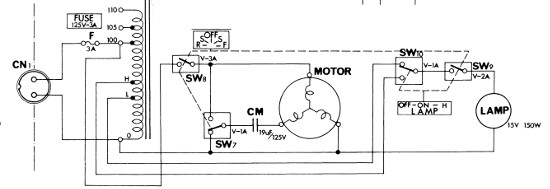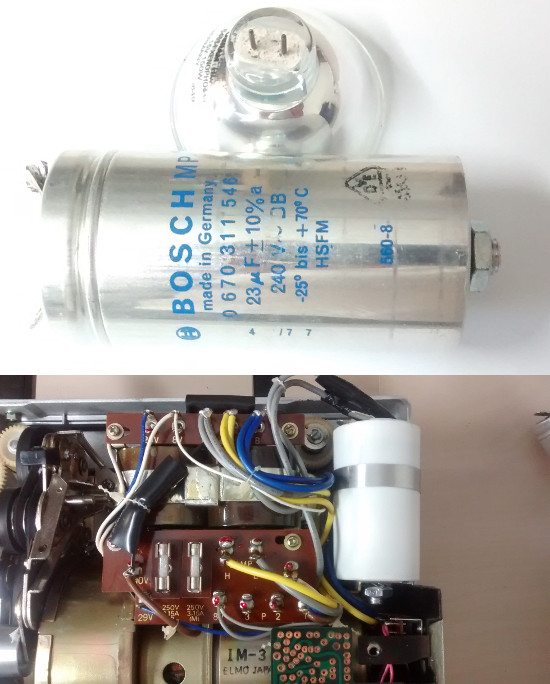This is topic I need help for my Elmo ST1200D burning new lamps (Solved) in forum 8mm Forum at 8mm Forum.
To visit this topic, use this URL:
https://8mmforum.film-tech.com/cgi-bin/ubb/ultimatebb.cgi?ubb=get_topic;f=1;t=013097
Posted by Renzo Dal Bo (Member # 5688) on September 12, 2019, 10:53 AM:
Hi everyone
Briefly the projector has started to burn new lamps (Osram HLX 15V 150W).
I have just checked the AC voltage at the lamp holder and at the secondary of the transformer. The voltage meter reads the correct voltage values: about 12V at the first lamp switch step and about 14V at the second step. Do you have any suggestions before to take apart the projector?
Thank you so much.
Posted by Steve Klare (Member # 12) on September 12, 2019, 11:23 AM:
H Renzo,
How are the lamps failing? Is the filament blowing? Are the contact pins disintegrating?
Your voltage shouldn't blow lamps in of itself, actually voltages below the 15V rating are good for longer (and dimmer) lamp lives, but then again is the lamp getting enough cooling air from the blower?
If the pins are disintegrating it probably means the socket isn't making a good electrical connection and the high temperature is burning up the pin.
The ST-1200 socket has a reputation for doing this. It only touches the pins at two points and once these small areas oxidize the resistance climbs way up.
Posted by Renzo Dal Bo (Member # 5688) on September 12, 2019, 12:15 PM:
Thank you Steve for your kind and very fast answer.
It is very strange also for me. I have already burned two new lamps just taken off their boxes (Osram HLX 64634). Both their filaments lighted on and then instantly burned. They did not either have time to warmed up and the blower correctly works. Thinking they were from a defective stock, I also took from another projector a used lamp of different brand (Philips) with the same result. I checked the lamp holder and it seems in good condition. It has inside two copper blades with springs on their tips that don't show oxidation or burning evidences ...
Posted by Steve Klare (Member # 12) on September 12, 2019, 12:29 PM:
Yes,
It sounds like defective bulbs. The only thing that keeps the filaments from burning up is the lack of oxygen inside the envelope.
-but if air leaks in there!
Posted by Leon Norris (Member # 3151) on September 12, 2019, 12:32 PM:
Renzo, it could be the lamps? You have gotten a bad batch!.it has happen to me! Try another lamp or different brand! Or replace the lamp socket? Or you can replace the lamp socket wires! It could be a short some were? Check it out!
Posted by Tom Photiou (Member # 130) on September 12, 2019, 02:11 PM:
It'll almost certainly be arcing at the bule bulb connector.i had the same problem and had a mofified bulb connector sorted. Now alls well.
Posted by Renzo Dal Bo (Member # 5688) on September 13, 2019, 07:48 AM:
Thank you all.
I don't have the schematic diagram of the Elmo ST1200D, but I took a look at that one of Elmo ST1200, I assume it is similar.
Do you think it could be a failure of the motor capacitor?
If at any time it had a leakage, over a certain voltage value (it works at 100V AC), it could discharge itself through the lamp circuit whose potential is lower.
I would like to know your opinion.
[ September 13, 2019, 11:01 AM: Message edited by: Renzo Dal Bo ]
Posted by Phil Murat (Member # 5148) on September 13, 2019, 09:26 AM:
Hi Renzo,
Don't worry, logicaly power bus for lamp is seperated from power bus for motor(s) & Electronics cards.
Voltage Transformer is supposed to show 2 separates Secondary coils (at least)
Voltage coming into lamp is a simply AC not regulated, not filtered, etc..
I suggest you to monitor AC voltage comming to the lamp (when lamp is working) . Logicaly it has not to exceed 16,5v.
Let us know also if transformer is hot or not.
Is it possible to adjust incomming voltage for your machine ? (from 220v to 240v or 250V)
If not, what is actual home voltage at this time ?
Posted by Renzo Dal Bo (Member # 5688) on September 13, 2019, 10:49 AM:
Hi Phil,
as I already told above, I have monitored the voltage values at the lamp holder and they apparently are OK, but all the lamps I put in the projector instantly burn despite they were new. Unfortunately the digital voltage meter, for its inertia, is not able to show me any instant impulse of voltage. The problem suddenly happened, but the other projector functions at present correctly work (Motor, Audio magnetic/optical). Here is the related schematic:

(Just a note: only now I have seen that you live in Villeneuve St. Georges, ... I was there for 2 weeks in June. What a pity ... a missed occasion to meet another forum member)
Posted by Phil Murat (Member # 5148) on September 13, 2019, 02:02 PM:
Hi Renzo,
When I see this schematic diagram , I understand your question concerning motor and its capacitor.
To tell you the truth , I don't understand how it can work with such a schema.
Is the main motor fed with 220 or 110 V ?
Posted by Steve Klare (Member # 12) on September 13, 2019, 02:51 PM:
This motor is 100VAC, which is the Japanese standard for domestic wiring.
This is showing an auto-transformer. It's a single winding with taps. If you tap in the load between Hot and Neutral, you get less voltage on the load. If you tap in Hot between the load and Neutral you get more voltage on the load than Hot-Neutral.
In this case the machine is tapped for 100VAC operation. This also shows taps for 105 and 110, but none for 220.
This schematic is kind of surprising: I'd expect a regular transformer with separate windings.
Posted by Renzo Dal Bo (Member # 5688) on September 13, 2019, 05:42 PM:
Phil and Steve,
the version of this projector for Europe has a transformer where the main inlet is 220/240V (in primary side) but it has the same exit of 100V for the motor but its capacitor is 23uF-240V instead of 19uF-125V.
I would try to substitute the capacitor with a new one to see if something will change.
Posted by Maurice Leakey (Member # 916) on September 14, 2019, 04:23 AM:
Looking at the schematic does not show any possible connection between the capacitor and the lamp circuit. Only their neutral is connected when the main switch is at its OFF position.
I suspect the lamp holder.
I had trouble with my 16mm Bell & Howell TQIII which blew three EMM lamps within the hour. The fault was traced to the lamp holder.
My Bell & Howell and the Elmo lamp holders are quite similar with the lamp pins sliding into their holder. In my case the two sprung contacts had lost their tight fit onto the lamp pins through many years of use. This produced severe arcing due to their bad contact and this caused the lamps to burn out.
Posted by Renzo Dal Bo (Member # 5688) on September 14, 2019, 05:40 AM:
Bingo!!!
Problem is apparently solved with a capacitor substitution.
I suspect that a sudden leak of the capacitor at a certain value of variable voltage, brought the lamp to burn immediately when it was turned on.
Maurice I had already checked the lamp holder and its contacts, and I found them in very good conditions with no signs of oxidation or burning.
Thank you all for the useful suggestions that made me pointing toward the solution.
[ September 15, 2019, 11:55 AM: Message edited by: Renzo Dal Bo ]
Posted by Maurice Leakey (Member # 916) on September 14, 2019, 06:13 AM:
Renzo
You will replace the capacitor?
I see the schematic for the ST-1200HD shows three capacitors in this position!
Perhaps your model is slightly different.
Posted by Phil Murat (Member # 5148) on September 14, 2019, 06:31 AM:
Excellent Renzo !!!
So can we deduct this capacitor could damp any overvoltage peak when lamp is switched on (or is this capacitor help motor to start too.....) ?
Did you install an new stronger one ?
Thanks Steve for your explanation for this schematic, I began to understand better this design.
However, my feeling is this design is not very safe. Seperate bus should be better
Posted by Renzo Dal Bo (Member # 5688) on September 15, 2019, 01:15 PM:
I am sorry, but I had to partially modify my previous post because I realized I had said some stupid things. My studies on alternating currents circuits are far away in time and I'm not an expert of them!
Phil, that capacitor is necessary for the start motor run in the correct direction.
Maurice, I found inside the projector only one capacitor of 23uF (+/-10%)/240V that I substituted with a 20uF(+/-5%)/400V capacitor, whose dimensions perfectly fit.
I never had the schematics of my Elmo ST-1200D, but I supposed they were similar to the ones of its predecessor, the ST-1200, that I showed above.
I think I was very lucky to solve the problem, but I would like someone expert explains to me why the failure of this capacitor could damage the lamps.

Posted by Maurice Leakey (Member # 916) on September 15, 2019, 01:55 PM:
Renzo
That was a wise move to fit a capacitor with a 400 volt in place of the original 240 volt.
Posted by Phil Murat (Member # 5148) on September 16, 2019, 02:26 AM:
Yes Maurice, 240V is not safe enough.
However for a 450v one, size is 40mm x 95mm (around)
Posted by Brian Fretwell (Member # 4302) on September 16, 2019, 09:21 AM:
Maybe the failure of the capacitor allowed a voltage spike on the lamp circuit which caused it to blow. You would have needed an oscilloscope to see it it it were very brief.
Visit www.film-tech.com for free equipment manual downloads. Copyright 2003-2019 Film-Tech Cinema Systems LLC

UBB.classicTM
6.3.1.2

